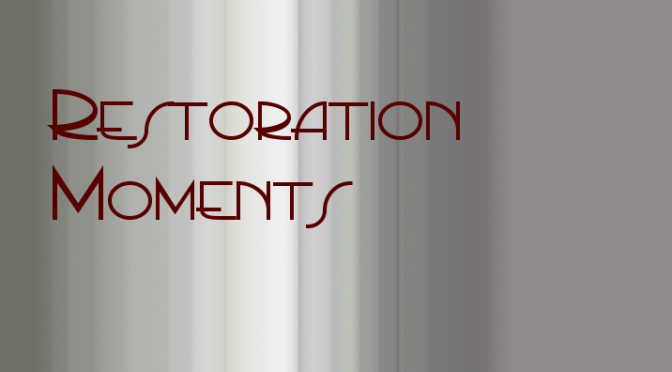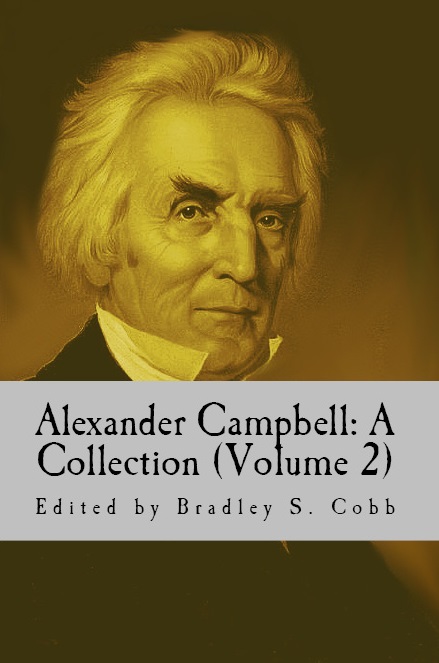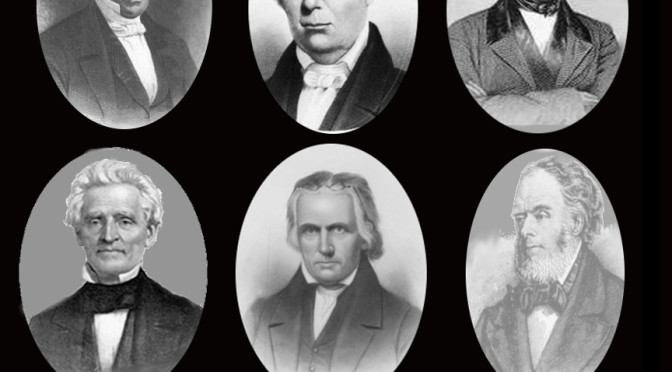The following article is 170 years old, but speaks to a problem that still plagues many people today. That is, when someone dies, their friends want them preached into heaven–regardless of how they lived their life on earth.
President Andrew Jackson had recently died, and there were many people claiming that he had been a Christian, and would be awaiting them in heaven. Here’s how Alexander Campbell and the Millennial Harbinger responded (1845):
GENERAL ANDREW JACKSON.
That General Jackson was as true a patriot as any living man, according to his views of patriotism, and of his country’s rights and honor, I never doubted. That he was a great General, and possessed of as great animal courage and decision of character as most other men,—nay, much more than most men,—I have always conceded. That he was also as accomplished a gentleman in his manners as any other man in the nation, and possessed of a great mind of a very particular order, I have always cheerfully admitted.
But that any of these are Christian virtues, or that he during his life exhibited any of the characteristic excellencies of a Christian, has never been demonstrated to my satisfaction. On the contrary, he was characteristically profane, irreverent, and enslaved to passion—even to a proverb. Still, that he may have repented and been forgiven in his last moments, no man can confidently and consistently deny. But that there is any positive evidence of it, I have not as yet learned.
Our worthy and excellent correspondent, Father Henley, now almost in sight of the promised land, feels it his duty to bear a decided testimony against the perversion of sacred scripture in the instances specified in connection with the last moments of the Hero of New Orleans. I could not with propriety refuse the privilege he demands, although my great respect to the memory of so distinguished a citizen is such as to induce me to prefer that it had happened in some other case. Still, as the passion and the fashion of the age is to send all great men to heaven despite of all that they may have said or done, with or without a professed repentance, the occasion justifies a remonstrance against such a profanation of things sacred and divine. The more illustrious the name, probably the more necessary and justifiable the remonstrance against such abuses. Were it a case of some mean or contemptible person, the remonstrance might be less effectual than when administered in relation to one whose public benefits are so generally appreciated, and whose fortunes, good or bad, are the fortunes of his country. To reprove sin in the humbler walks of life, and to wink at it in the higher, is too much the fashion of this age—and it is the characteristic of a mean, worldly, and servile spirit. It was not so with Nathan, Elijah, or John the Harbinger, nor with any one with whom God was well-pleased.
I never had much faith in death-bed repentance, and especially in a death-bed repentance in old age. I have less and less as my experience and observation are enlarged. When men, living under the gospel, give their lives to the world, the flesh, and the devil; and when paralyzed with age, when all their passions, except those of ambition and avarice, have died, stretch out their palsied hand to the Lord and sue for mercy, I am sorry to say that I cannot entertain any well-grounded hope of their salvation. Had they, like the dying thief, never known anything of the gospel till the last scene of life’s drama, and then on hearing the voice of mercy, turned with all their hearts to the Lord, I might have some encouragement to hope that the Lord might graciously forgive and receive them. But he that has often been reproved and still hardens his heart, shall, said King Solomon, “suddenly be destroyed, and that without remedy.” Men almost, if not universally, die as they live. No man dies laughing, it is true. “Atheists, men may live, but Atheists, they cannot die,” the poet saith. Still as men live in their general character they die. But we shall hear Father Henley on what he calls
THE BIBLE PROSTITUTED.
Hillsborough, King & Queen, June21, ’45.
Beloved brother Campbell:
Dear Sir—It is always unpleasant to call to mind the errors and vices of men living; but much more so after their death. But when the friends of the deceased General Jackson have been so imprudent as to publish to the world that which will injure the rising generation, and constitute a prostitution of the Spirit of Truth, as revealed in the Bible, the friends of the deceased cannot, in justice, complain against those who shall step forward and endeavor to disenthrall those sacred principles from the grasp of the errors of sectarianism, which is a hindrance to the salvation of the world.
Was General Jackson looked upon as a common citizen, no notice from me would be taken of his perversions of “the spirit, principles, and statutes of that Holy Book” (which he says) “have been the rule of my life, and I have tried to conform to its spirit as near as possible. Upon that sacred volume I rest my hope of eternal salvation, through the merits and blood of our blessed Lord and Savior Jesus Christ.” This was said in answer to “some reverend gentleman’s” inquiries on the 29th of May last. See the Richmond Times, June 20th, 1845.
On the 2nd of June “he read many letters—one from Major Donalson, giving an account of the proceedings of the British Minister Elliott to prevent annexation. Mr. Tyack quotes the General as having spoken under the exciting influence of these details in the following characteristic language:”—
“We have made a disgraceful sacrifice of our territory. An important portion of our country was given away to England without a shadow of title on the part of the claimants, as has been shown by the English Ministers on referring in Parliament to the King’s map, on which the true boundaries were delineated, and of which they were apprized when urging their demands.” See “rimes” as above.
“Right on the side of the American people, and firmness in maintaining it,” he continued, “with trust in God alone, will secure to them the integrity of the possession of which the British government would now deprive them I am satisfied that they will assert and vindicate what justice awards them; and that no part of our territory or country will ever be submitted to any arbitration but of the cannon’s mouth.”
Let us look at, and extract from, “a Biographical Sketch of his (public) Life,” until he was President of the United States, published on his death, in “the Philadelphia U. S. Gazette, furnished for that paper by a young gentleman who had acquaintance with the materials for a biography, with which he had been laboring for a volume.”
This last part is published in the Times. In his first campaign, it is said, “he disobeyed orders from the Secretary of War.” His biographer records five battles he had with the Indians and English, and left dead on the field about four thousand human beings. He says nothing, as I have seen, of his having sacrificed the lives of American citizens, who had been acquitted as not guilty by a regular court martial of his own choice. Neither does he mention the duels and public frays he had been engaged in; nor the tyrannical and despotic course he has pursued towards all those that differed with him upon any subject. We shall say nothing of his private character, than now published, until forced by his friends, in defense of the Bible; nor should we have doubted so much of his salvation, had he recorded his deep repentance, reformation, and immersion for the remission of his sins, and not have breathed the spirit of vengeance towards an enemy, as his last communication to his friends now proves.
Let us now contrast this published sketch of his life by his friends with the words of the Savior and his Apostles, of whom he says he has made their teaching “the principles and statutes the rule of his life,[1] and has tried to conform to its spirit as near as possible.” I appeal to every Christian who fears God and keeps the commandments of Jesus, to say whether there is one example or precept of the Savior or his Apostles that authorizes the belief that the above sketch of the character of General Jackson, given by his friends, is in any wise the rule laid down by them for the salvation of sinners; or whether such a life is in any wise conformable to the spirit of the gospel.
Painful as is this subject to me, and may prove to others, I am constrained to say, from a sense of duty I owe to God and the whole human family, that I have not the least hope of the salvation of any such a character without deep repentance and reformation, though he may be a believer in the Son of God and have been immersed for the remission of sins. To an obedient penitent believer, such as “continue in well doing, seeking for glory, honor, immortality,” the Apostle says, “eternal life,” will be given. The Savior says, “Not every one that says Lord, Lord, shall enter into the kingdom of heaven; but he that DOETH the will of my Father which is in heaven.” We call upon these panegyrists[2] of General Jackson to prove from the New Testament, if they can, that in it “eternal salvation” is promised to any but humble, penitent, obedient believers. If this cannot be done, and he died without repenting and confessing his sins, for requesting or hoping “that no part of our territory or country [though he admits it has been given away to England] will be submitted to any arbitration but at the cannon’s mouth;” how can anyone represent him as then possessing the spirit of a Christian! To me this is a horrid, murderous spirit, for a professing Christian at any time, much more so in the hour of death. This proves “the ruling passion strong in, death.” Hear now the spirit he professes he has tried to conform to:— “He that loveth not his brother, abideth in death. Whosoever hateth his brother, is a murderer; and ye know that no murderer hath eternal life abiding in him.” 1 John 3:14-15. “Hereby perceive we the love of God, because he laid down his life for us; and we ought to lay down our lives for the brethren.” “Ye adulterers and adulteresses, know ye not that the friendship of the world is enmity with God? Whosoever, therefore, [whether General Jackson or any other man] will be a friend of the world is the enemy of God.” James 4:4. “But God forbid I should glory, save in the cross of our Lord Jesus Christ, by whom the world is crucified unto me, and I unto the world.” Galatians 6:14. “See that none render evil for evil unto any man; but ever follow that which is good among yourselves, and to all men.” 1 Thessalonians 5:15. Again, “Love not the world, neither the things that are in the world. If any man love the world, the love of the Father is not in him.” “No man can serve two masters; for either he will hate the one and love the other, or else he will hold to the one and despise the other. Ye cannot serve God and Mammon.” Matthew 6:24. Jesus says to his disciple that drew the sword to defend him, and had cut off the ear of a servant of the high priest, “Put up again thy sword into its place; for all that take the sword shall perish with the sword.” Matthew 26:52.
I ask, are these scriptures in conformity to General Jackson’s rejecting any other arbitration for a disputed claim than that of “the cannon’s mouth”? This, his friends say, is characteristic of him. General Jackson being a witness, says “the Bible is true.” Then it clearly appears, as the Bible is true, for him to make a profession of the hope of eternal salvation under the influence of such a spirit and character, “through the merits and blood of our blessed Lord and Savior Jesus Christ,” without repenting of such language as it is said he uttered, is a prostitution of the spirit of truth as far as he is believed. Let it be remembered that the throne of God would cease to exist as being righteous, were he to cast off any immersed, penitent, obedient believer in Jesus Christ, who searches his heart daily and hourly in order to find out, confess, and forsake his sins, and devoutly to keep the commandments of Jesus. No, this can never be. But also remember, that without repentance, reformation and obedience, God will not forgive any sinner under the gospel dispensation. (See Luke 13:1-5; 19:8-10.) Thus men and women perish because they will not repent and obey the gospel of Jesus Christ. To hope for salvation without this change, is what Job calls the “hope of the hypocrite,” and Solomon says, “The hypocrite with his mouth destroyeth his neighbor.” Proverbs 11:9.
Yours as ever,
THOMAS M. HENLEY.
[1] Italicizing from the original correspondent.—A..C.
[2] Praisers.—Editor.

